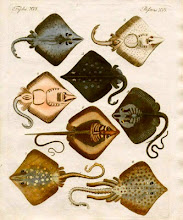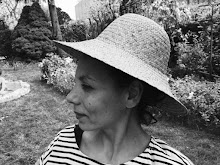by Truman Capote
She is tall and slender, perhaps seventy, silver-haired, soigné, neither black nor white, a pale golden rum colour. She is a Martinique aristocrat who lives in Fort de France but also has an apartment in Paris. We are sitting on the terrace of her house, an airy, elegant house that looks as if it was made of wooden lace: it reminds me of certain old New Orleans houses. We are drinking iced mint tea slightly flavoured with absinthe.
Three green chameleons race one another across the terrace; one pauses at Madame’s feet, flicking its forked tongue, and she comments: “Chameleons. Such exceptional creatures. The way they change colour. Red. Yellow. Lime. Pink. Lavender. And did you know they are very fond of music?” She regards me with her fine black eyes. “You don’t believe me?”
During the course of the afternoon she had told me many curious things. How at night her garden was filled with mammoth night-flying moths. That her chauffeur, a dignified figure who had driven me to her house in a dark green Mercedes, was a wife-poisoner who had escaped from Devil’s Island. And she had described a village high in the northern mountains that is entirely inhabited by albinos: “Little pink-eyed people white as chalk. Occasionally one sees a few on the streets of Fort de France.”
“Yes, of course I believe you.”
She tilts her her silver head. “No, you don’t. But I shall prove it.”
So saying, she drifts into her cool Caribbean salon, a shadowy room with gradually turning ceiling fans, and poses herself at a well-tuned piano. I am still sitting on the terrace, but I can observe her, this chic, elderly woman, the product of varied bloods. She begins to perform a Mozart sonata.
Eventually the chameleons accumulated: a dozen, a dozen more, most of them green, some scarlet, lavender. They skittered across the terrace and scampered into the salon, a sensitive, absorbed audience for the music played. And then not played, for suddenly my hostess stood up and stamped her foot, and the chameleons scattered like sparks from an exploding star.
Now she regards me. “Et maintenant? C’est vrai?”
“Indeed. But it seems so strange.”
She smiles. “Alors. The whole island floats in strangeness. This very house is haunted. Many ghosts dwell here. And not in darkness. Some appear in the bright light of noon, saucy as you please. Impertinent.”
“That’s common in Haiti, too. The ghosts there often stroll about in daylight. I once saw a horde of ghosts working in a field near Petionville. They were picking bugs off coffee plants.”
She accepts this as fact, and continues: “Oui. Oui. The Haitians work their dead. They are well known for that. Ours we leave to their sorrows. And their frolics. So coarse, the Haitians. So Creole. And one can’t bathe there, they sharks are so intimidating. And their mosquitoes: the size, the audacity! Here in Martinque we have no mosquitoes. None.”
“I’ve noticed that; I wondered about it.”
(to be continued . . . )
Subscribe to:
Post Comments (Atom)




No comments:
Post a Comment